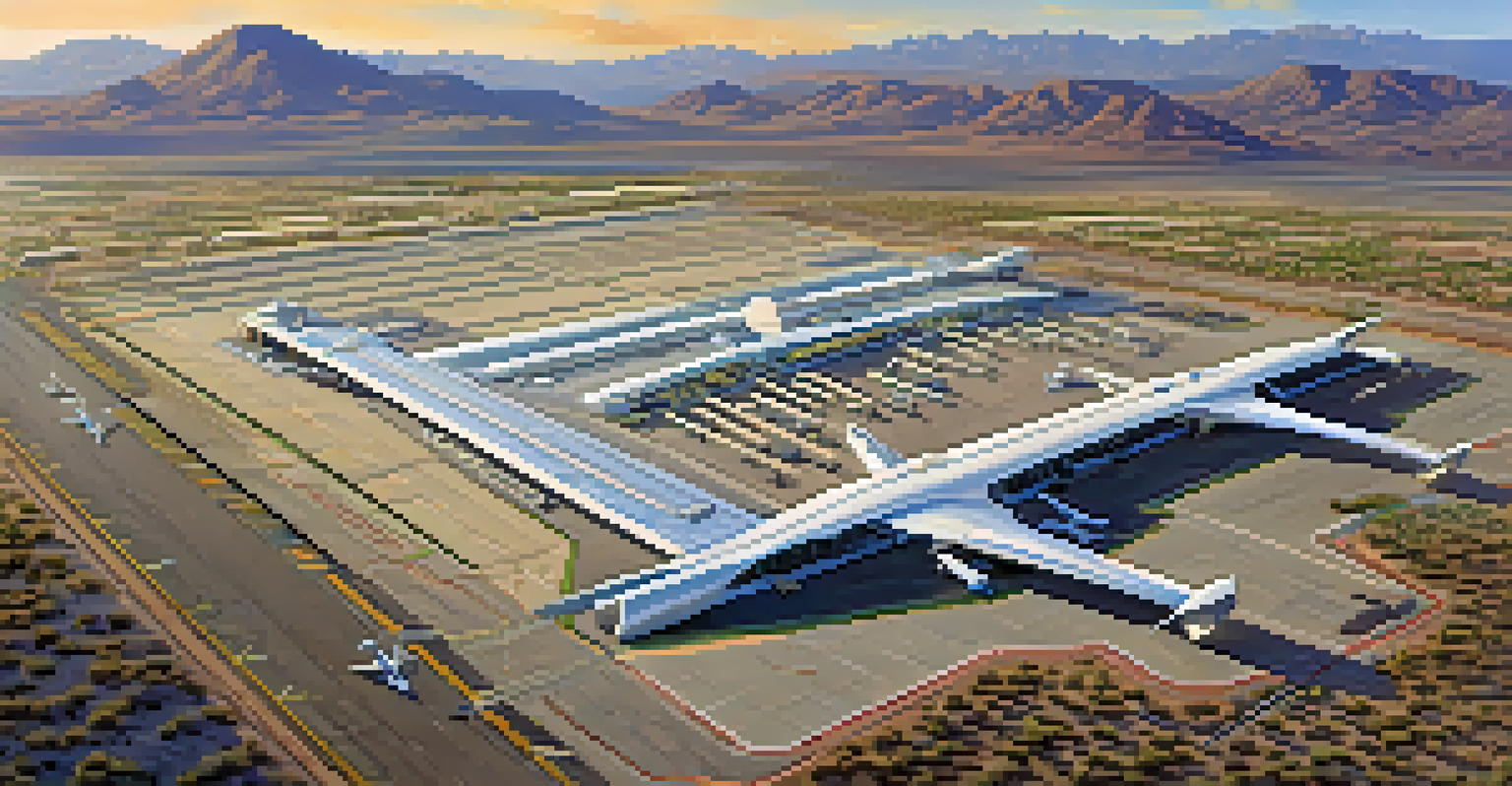The Role of Tucson International Airport in Local Economy

Tucson International Airport: Gateway to Economic Growth
Tucson International Airport (TIA) serves as a vital hub for both travelers and cargo, significantly impacting the local economy. With its strategic location, the airport facilitates easy access to the region, attracting businesses and tourists alike. This connectivity not only enhances trade but also promotes Tucson as a desirable destination for conferences and events.
The airport is the gateway to a community's economic growth.
The airport's influence extends beyond transportation; it plays a crucial role in job creation. TIA employs thousands directly and supports many more in the surrounding community through various sectors like hospitality, retail, and logistics. As more flights and services are added, the potential for job growth continues to expand.
Moreover, TIA contributes to the local economy by generating revenue through various channels, including parking fees, concessions, and landing rights. These funds are reinvested into the airport and the surrounding infrastructure, further enhancing the region's economic vitality and quality of life.
Boosting Tourism: A Vital Economic Driver
Tourism is a major economic driver in Tucson, and TIA plays a pivotal role in this sector. With direct flights to major cities, the airport makes it convenient for tourists to explore Tucson's rich cultural heritage and stunning landscapes. This accessibility encourages more visitors, which in turn supports local businesses, from restaurants to attractions.

Events like the Tucson Gem and Mineral Show and the Tucson Marathon attract thousands of visitors each year, significantly benefiting the local economy. The influx of tourists during these events creates a ripple effect, resulting in increased spending in hotels, restaurants, and shops. TIA's ability to connect Tucson to these larger events helps sustain this economic boost.
Economic Growth Through Connectivity
Tucson International Airport enhances local economic growth by attracting businesses and tourists through its strategic location and flight accessibility.
Additionally, TIA collaborates with local tourism boards to promote the region and its attractions. By actively engaging in marketing efforts, the airport helps to ensure that Tucson remains on the radar for potential travelers, which is vital for the health of the local economy.
Supporting Local Businesses and Entrepreneurs
Tucson International Airport also plays a significant role in supporting local businesses and entrepreneurs. By providing essential cargo services, TIA enables companies to efficiently transport goods, which is crucial for their growth. This logistical support can be a game-changer for small businesses looking to expand their reach.
Tourism is the lifeblood of our economy, and accessibility is key.
Furthermore, the airport is home to various business facilities, including office spaces and meeting rooms, which cater to both local companies and traveling professionals. This creates an environment that fosters collaboration and innovation, encouraging local entrepreneurs to connect and grow.
Moreover, TIA's commitment to working with local suppliers and contractors strengthens the economic fabric of the community. By prioritizing local partnerships, the airport not only boosts its own operations but also invests in the region's economic resilience.
Infrastructure Development and Investment
Infrastructure development is another crucial aspect of TIA's impact on the local economy. Continuous investments in airport facilities, runways, and technology enhance the overall travel experience and operational efficiency. Such improvements not only attract more airlines and flights but also ensure a seamless experience for travelers.
The airport’s expansion projects often create a surge in construction jobs and related activities, benefiting the local workforce. These projects can range from upgrading terminals to improving accessibility, showcasing TIA's role in driving economic activity through infrastructure enhancements.
Supporting Local Business Expansion
TIA provides essential cargo services and business facilities that empower local entrepreneurs and companies to grow and thrive.
Additionally, these investments have a long-term positive effect on property values in the surrounding areas. As TIA grows and modernizes, nearby neighborhoods often see increased demand, leading to further economic development and community investment.
Environmental Responsibility and Community Engagement
Tucson International Airport is committed to environmental responsibility, which plays a vital role in its economic strategy. By implementing sustainable practices, such as energy-efficient systems and waste reduction initiatives, TIA not only minimizes its ecological footprint but also attracts environmentally-conscious travelers and businesses.
Community engagement is also a key focus for TIA, as the airport actively collaborates with local organizations and stakeholders. These partnerships help address community needs and concerns while promoting economic development initiatives that benefit the entire region. By fostering a positive relationship with the community, TIA enhances its reputation and support.
Moreover, TIA often hosts educational programs and events to raise awareness about its initiatives and the importance of sustainable travel. This community-focused approach not only reinforces its commitment to the environment but also strengthens the local economy by promoting responsible tourism practices.
The Role of Technology in Economic Growth
Technology plays an increasingly important role in Tucson International Airport's operations and its economic impact. By adopting advanced systems for managing flights and passenger services, TIA enhances efficiency and improves the overall travel experience. This technological edge helps to attract more airlines and travelers to the region.
In addition to operational improvements, TIA's investment in technology supports local businesses that rely on logistics and transportation. Enhanced tracking systems and data analytics provide valuable insights that help companies streamline their operations and maximize profitability. This synergy between the airport and local enterprises fosters economic growth.
Investment in Infrastructure and Tech
Continuous investments in airport infrastructure and technology improve operational efficiency and create job opportunities, further benefiting the local economy.
Moreover, technological advancements can create new job opportunities in fields like IT and data management. As TIA continues to innovate, it not only strengthens its own position but also contributes to the development of a skilled workforce in the local economy.
Future Prospects: Expanding Economic Opportunities
Looking ahead, Tucson International Airport is poised to play an even more significant role in the local economy. With ongoing expansion plans and strategic partnerships, TIA aims to enhance its service offerings, which could lead to increased air traffic and economic benefits for the region. This proactive approach ensures that Tucson remains competitive in the aviation industry.
The airport is also exploring new routes and international partnerships, which could open up additional markets for local businesses. As TIA strengthens its global connectivity, it not only facilitates travel but also enhances trade opportunities, benefiting the economy as a whole.

Furthermore, as the region continues to grow, TIA's focus on sustainability and community engagement will be paramount. By balancing economic growth with social and environmental responsibility, Tucson International Airport can ensure a prosperous future for both itself and the local economy.